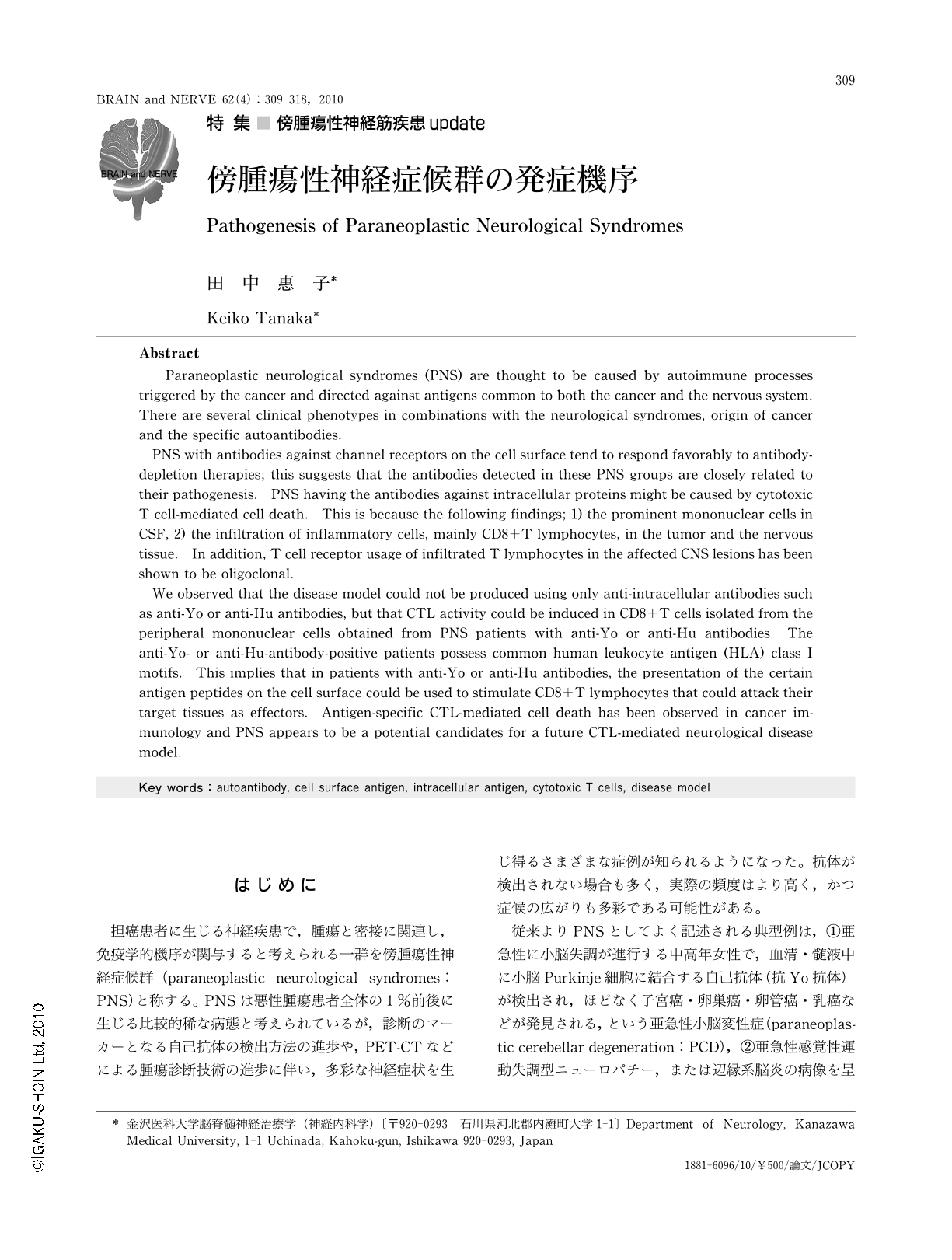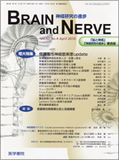Japanese
English
- 有料閲覧
- Abstract 文献概要
- 1ページ目 Look Inside
- 参考文献 Reference
はじめに
担癌患者に生じる神経疾患で,腫瘍と密接に関連し,免疫学的機序が関与すると考えられる一群を傍腫瘍性神経症候群(paraneoplastic neurological syndromes:PNS)と称する。PNSは悪性腫瘍患者全体の1%前後に生じる比較的稀な病態と考えられているが,診断のマーカーとなる自己抗体の検出方法の進歩や,PET-CTなどによる腫瘍診断技術の進歩に伴い,多彩な神経症状を生じ得るさまざまな症例が知られるようになった。抗体が検出されない場合も多く,実際の頻度はより高く,かつ症候の広がりも多彩である可能性がある。
従来よりPNSとしてよく記述される典型例は,①亜急性に小脳失調が進行する中高年女性で,血清・髄液中に小脳Purkinje細胞に結合する自己抗体(抗Yo抗体)が検出され,ほどなく子宮癌・卵巣癌・卵管癌・乳癌などが発見される,という亜急性小脳変性症(paraneoplastic cerebellar degeneration:PCD),②亜急性感覚性運動失調型ニューロパチー,または辺縁系脳炎の病像を呈し,神経細胞の核に反応する自己抗体(抗Hu抗体)が検出される肺小細胞癌の一群,③Lambert-Eaton筋無力症候群(myasthenic syndrome)(LEMS)を呈し,電位依存性カルシウムチャネル(voltage-gated calcium channel:VGCC)に対する抗体を伴いSCLCを有する群(paraneoplastic LEMS),④消化器癌などを有する高齢男性に多い皮膚筋炎,などが代表的病型と考えられている1-4)。
PNSでは腫瘍細胞と神経組織に共通に発現する抗原(onconeural protein)に対して生じた免疫反応が,神経組織を攻撃する機序が考えられている。この中には血清・髄液中に存在する抗体が重要な役割を担うと考えられる場合と,細胞傷害性T細胞の関与が考えられる場合がある。
Abstract
Paraneoplastic neurological syndromes (PNS) are thought to be caused by autoimmune processes triggered by the cancer and directed against antigens common to both the cancer and the nervous system. There are several clinical phenotypes in combinations with the neurological syndromes, origin of cancer and the specific autoantibodies.
PNS with antibodies against channel receptors on the cell surface tend to respond favorably to antibody-depletion therapies; this suggests that the antibodies detected in these PNS groups are closely related to their pathogenesis. PNS having the antibodies against intracellular proteins might be caused by cytotoxic T cell-mediated cell death. This is because the following findings; 1) the prominent mononuclear cells in CSF, 2) the infiltration of inflammatory cells, mainly CD8+T lymphocytes, in the tumor and the nervous tissue. In addition, T cell receptor usage of infiltrated T lymphocytes in the affected CNS lesions has been shown to be oligoclonal.
We observed that the disease model could not be produced using only anti-intracellular antibodies such as anti-Yo or anti-Hu antibodies,but that CTL activity could be induced in CD8+T cells isolated from the peripheral mononuclear cells obtained from PNS patients with anti-Yo or anti-Hu antibodies. The anti-Yo- or anti-Hu-antibody-positive patients possess common human leukocyte antigen (HLA) class I motifs. This implies that in patients with anti-Yo or anti-Hu antibodies,the presentation of the certain antigen peptides on the cell surface could be used to stimulate CD8+T lymphocytes that could attack their target tissues as effectors. Antigen-specific CTL-mediated cell death has been observed in cancer immunology and PNS appears to be a potential candidates for a future CTL-mediated neurological disease model.

Copyright © 2010, Igaku-Shoin Ltd. All rights reserved.


